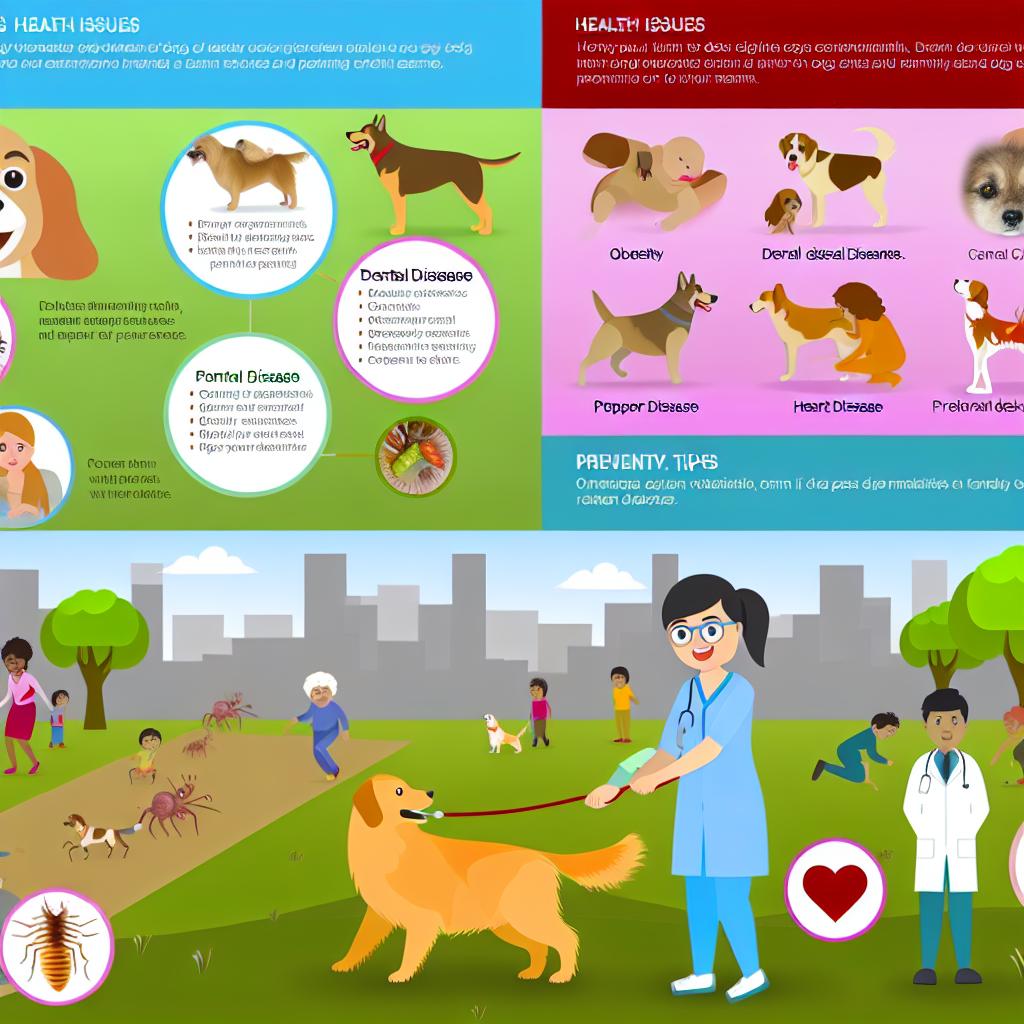
In ensuring the well-being of a canine companion, understanding and addressing various health concerns are paramount for any attentive owner. Compared to other animals, dogs are susceptible to a wide array of health conditions, many of which can be effectively managed or prevented with proper care and vigilance. Comprehensive knowledge of these health issues can help dog owners enhance the quality and longevity of their pet’s life. By identifying symptoms early and seeking appropriate veterinary care, life-threatening conditions can often be avoided. Furthermore, establishing good health practices from the outset can mitigate many potential problems before they arise.
Problem: Dental diseases, particularly periodontal disease, are prevalent among dogs, affecting a substantial portion of the canine population by the time they reach middle age. Periodontal disease results from plaque accumulation on teeth, leading to inflammation and infection of the gums and underlying bone structures. If untreated, it can result in tooth loss, significant pain, and even contribute to systemic issues affecting organs such as the heart and kidneys.
Prevention: Proactive dental care is vital. Regular brushing of your dog’s teeth with canine-specific toothpaste is highly recommended. Scheduling professional cleanings at regular veterinary visits can greatly reduce plaque and tartar buildup. Additionally, employing dental treats and diets specifically formulated to maintain oral health can further assist in reducing oral health issues. These measures not only enhance oral hygiene but also contribute to the overall health of your dog.
Problem: Obesity is a significant health concern affecting many dogs today, attributed mainly to overfeeding and insufficient physical activity. Excessive weight can exacerbate or precipitate various serious health conditions, such as diabetes, cardiovascular disease, and orthopedic issues, notably hip dysplasia and arthritis.
Prevention: To combat obesity, it is essential to ensure that your dog receives a nutritionally balanced diet suited to their age, size, and activity level. Regularly scheduled exercise is equally important, with activities tailored to suit the dog’s capacity and age. Measuring food portions accurately and limiting calorie-laden treats can prevent excess weight gain. Engaging your dog in physical activities, whether it be walks, runs, or playtime, is beneficial to their physical and mental well-being.
Problem: Dogs are vulnerable to a variety of parasites, both ectoparasites like fleas and ticks, and endoparasites such as heartworms and intestinal worms. These parasites not only cause discomfort but can also transmit diseases and lead to severe health issues if not addressed promptly.
Prevention: Administering periodic preventative treatments is crucial in safeguarding your dog against these parasites. Many products, ranging from topical applications to oral medications, are available to repel and kill fleas, ticks, and internal parasites. Maintaining a clean environment by regularly washing bedding and vacuuming carpets reduces the risk of infestations. Routine check-ups with a veterinarian for stool analysis and blood tests can help identify and treat any parasitic infections early on.
Problem: Ear infections are notably prevalent in dog breeds with long, floppy ears, as these ears often trap moisture and debris. Infections can cause noticeable discomfort and, if neglected, may result in hearing impairment or more serious inner ear conditions.
Prevention: A consistent ear care routine can prevent the development of infections. Cleaning your dog’s ears with a veterinarian-recommended solution helps remove excess wax and debris. It is also essential to ensure their ears are thoroughly dried after bathing or swimming to avoid moisture retention. Observing your dog for signs of discomfort, such as head shaking or ear scratching, can provide early indications of potential issues.
Problem: Skin problems in dogs are a widespread concern, with symptoms ranging from mild irritations and rashes to serious infections. Conditions like allergies, bacterial infections, and mange can lead to symptoms such as itching, redness, or hair loss, compromising the dog’s quality of life.
Prevention: Regular grooming, including brushing and bathing with appropriate shampoos, can help prevent several skin issues. Owners should be cautious of potential allergens, whether in the environment or diet, and work with veterinarians to identify triggers. Providing a diet rich in essential fatty acids supports a healthy skin and coat, contributing to reduced incidences of skin problems.
Problem: Canine infectious diseases, such as those caused by parvovirus, distemper, and rabies, are highly contagious and can be fatal. These diseases pose significant health threats and require immediate veterinary attention upon suspicion.
Prevention: The cornerstone of preventing infectious diseases is vaccination. Puppies should begin their immunization schedule early, and it is important to adhere to the recommended booster schedule throughout a dog’s life. In addition to vaccination, minimizing exposure to potentially infected animals or environments can reduce the risk of infection.
Problem: Arthritis is a chronic condition that affects many dogs, especially larger breeds and older dogs. It involves the inflammation of joints and surrounding tissues, leading to pain, stiffness, and a decline in mobility.
Prevention: Arthritis can often be managed or its onset delayed by maintaining a healthy weight, as excess weight places undue stress on joints. Joint supplements, such as glucosamine and chondroitin, can support joint health. Regular moderate exercise contributes to muscle strength and joint flexibility, potentially alleviating arthritis symptoms. Tailoring exercises to the dog’s condition and capabilities ensures they remain active without overburdening their joints.
In conclusion, understanding and preventing these common health issues in dogs require a proactive approach through regular veterinary care, a balanced lifestyle, and vigilant observation for early signs of disease. Dog owners should seek further guidance from a veterinarian for a tailored health plan that best suits their pet’s needs. Proactive health management not only alleviates potential health issues but also contributes to a happier, healthier life for canine companions. For further reading on veterinary health care, explore resources available from reputable veterinary organizations, such as the American Veterinary Medical Association.